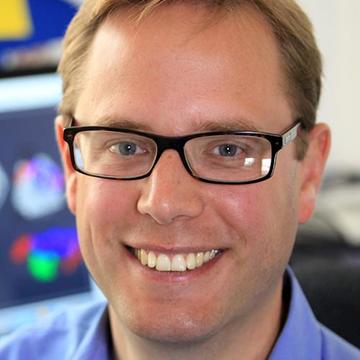Justin Benesch

Professor Justin Benesch
Professor of Biophysical Chemistry
My research focuses on developing and using new experimental methodologies that enable unprecedented quantitative insight into the states and structures that proteins adopt. In our group, we integrate the data we gather using these new techniques with computational strategies, incorporating evolutionary history and measurements of cellular activity to uncover the physico-chemical determinants of biomolecular function.
To overcome the structural heterogeneity frequently displayed by proteins and their complexes, we exploit the separative capabilities of mass spectrometry to probe and manipulate individual states—both at, and away from, equilibrium. This has allowed us to gain valuable insights into the processes of molecular recognition, and the regulation of protein interactions.
Quantifying Structural and Dynamical Heterogeneity
To understand protein function, we need to understand not only the structure of proteins, but also their dynamics, such as motion at interfaces, assembly into oligomers, and associations with binding partners. A major part of our work is understanding the quantitative underpinnings of these processes, examining in detail the energetic and kinetic parameters that govern how proteins (and other biomolecules) achieve and explore their functional state. To address this challenge, we have pioneered the combination of various experimental and computational methods, with a strong focus on mass measurement techniques.
Physico-chemical Pressures on Protein Evolution
Two years ago, we published a major work that uncovered for the first time how physico-chemical considerations have left their imprint on the evolution of protein assemblies (Hochberg et al, Science, 2018). We have since built on this work to investigate how thermodynamic entropy interacts with natural selection, and evolutionary history, as a pressure on the assembly state(s) populated by proteins, and on how they self- and co-assemble. A study we published this year reveals the origins of haemoglobin; it describes how its ancestral state evolved over hundreds of millions of years into the tetrameric, co-operatively binding oxygen carrier that haemoglobin is today (Pillai et al, Nature 2020).
Chaperoning Proteins Experiencing Force
We also have a strong interest in examining how proteins behave and interact with substrates under the stress conditions that organisms experience. These conditions range from acute events, such as excessive heat exposure; to cyclical processes, like muscle contraction or daily temperature variations; and chronic processes, such as ageing or climate change. Maintaining proteins in their functional forms during stress requires assistance from “molecular chaperones”, housekeeping proteins made by the cell. In our current research, we are focusing on the least well-understood family of the molecular chaperones, the Small Heat-Shock Proteins (sHSPs), monitoring their interactions and elucidating their mechanisms of interaction. In an important work for the field, we showed for the first time that the major human sHSP chaperones a key heart-muscle protein that undergoes cycles of unfolding and folding during the cardiac cycle, providing an important regulator of muscle elasticity.
After a degree in Chemistry at the University of Oxford, Justin obtained his PhD from the University of Cambridge for the development and application of novel mass spectrometry approaches working with Professor Dame Carol Robinson. He was awarded fellowships from the Medical Research Council and Royal Society, and appointed to faculty at the University of Oxford in 2012, where he is now Professor in Biophysical Chemistry. He is also Tutorial Fellow in Physical Chemistry at University College Oxford. Justin’s research has garnered an international reputation for innovative biophysical chemistry approaches, based on combing mass measurement with other experimental methods., simulations, and quantitative thermodynamic and kinetic analysis. This allows him and his group to change our thinking as to how proteins assemble, interact, and even evolve. This effort has been recognised by the Cell Stress Society international Alfred Tiessieres Award, the Howard Prize Lecture from the biophysical Science Institute at Durham and the Norman Heatley Award from the Royal Society of Chemistry in 2019. Justin is a founder of Refeyn Ltd, which provides mass photometry solutions to the life sciences community.




